As a devoted Azawakh parent, you know that your sleek, elegant hound is a sight to behold. But have you ever stopped to consider the health of your Azawakh’s eyes? Azawakh Eye Health isn’t just about keeping those expressive eyes sparkling. It’s about understanding the unique structure of your Azawakh’s eyes, being aware of common eye issues in this breed, and knowing how to prevent and treat these conditions.
Just like us, our canine companions can suffer from a variety of eye health issues. While some breeds are predisposed to certain conditions, others, like the Azawakh, have their own unique set of challenges. But don’t worry, as a holistic veterinarian, I’m here to guide you through everything you need to know about keeping your Azawakh’s eyes healthy and bright.
We’ll explore the importance of a holistic diet rich in natural Vitamin A and antioxidants, discuss the role of environmental hygiene, and take a look at routine Azawakh eye care and maintenance. We’ll also touch upon the common eye issues in Azawakh and how to prevent them. So, let’s get started on this journey to ensure the best possible eye health for your Azawakh!
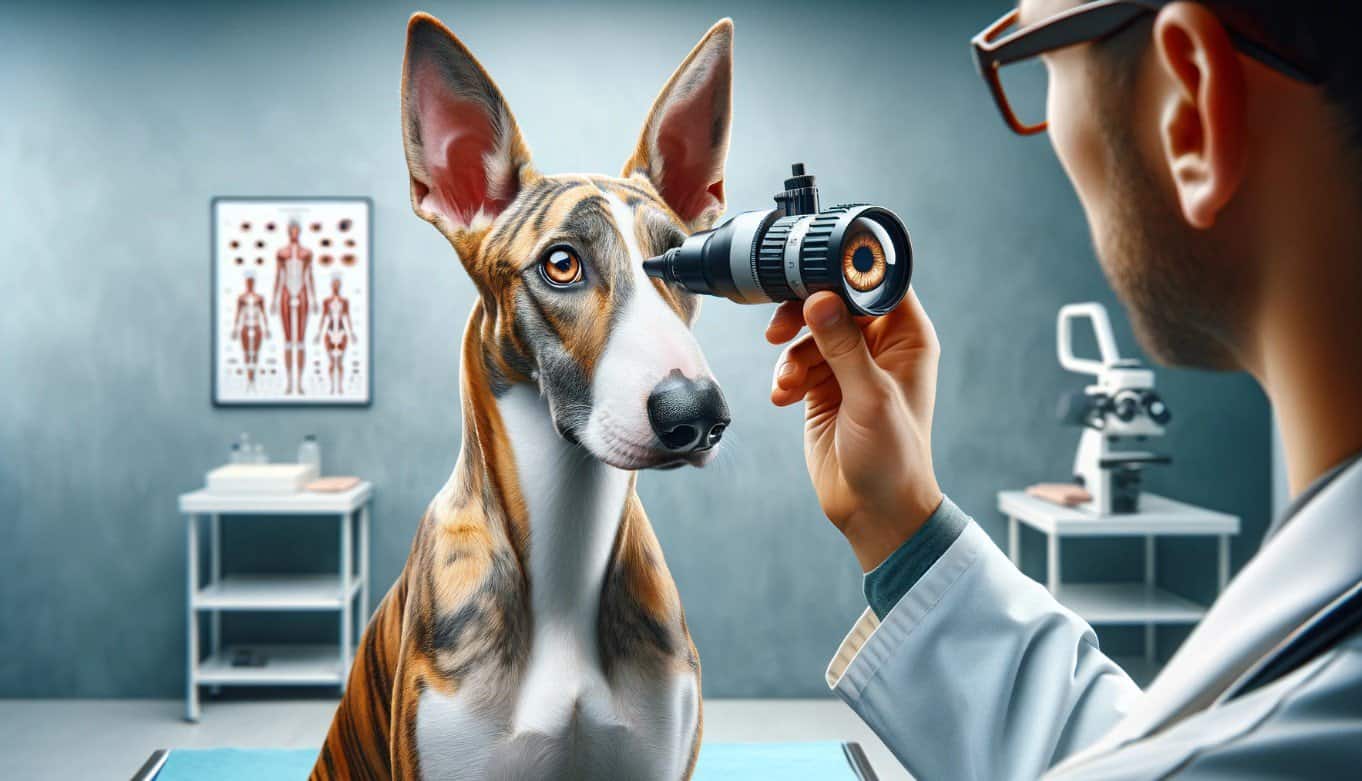
Understanding Breed Specific Eye Structure
If you’re a proud Azawakh owner, you understand the unique charm these dogs possess. Their eyes, in particular, are a captivating feature, often described as almond-shaped and full of expression. But, have you ever wondered about the specific structure of your Azawakh’s eyes? In this section, we will delve into the fascinating world of Azawakh eye health and the breed-specific eye structure of these elegant dogs.
Azawakhs, like other sighthounds, have a distinctive eye structure that sets them apart from other breeds. Their eyes are set deep in the skull, giving them a far-reaching field of vision, crucial for their historical role as hunting dogs in the Sahara and Sahel regions. This unique structure, coupled with their lean body, allows them to spot prey from great distances.
The Azawakh’s eyes are usually dark, ranging from dark brown to hazel. This coloration helps protect their sensitive eyes from the sun’s harsh rays—an adaptation from their desert origins. The shape of their eyes, often described as “almond-like,” is another distinct characteristic of the breed. This shape allows for better peripheral vision, again enhancing their ability to spot potential prey at a distance.
However, this unique eye structure also means that Azawakhs may be predisposed to certain eye health issues. For instance, their deep-set eyes can be more prone to injuries, and their desert-adapted dark pigmentation can sometimes lead to certain genetic eye conditions.
Understanding your Azawakh’s specific eye structure is the first step towards ensuring their eye health. With this knowledge, you can better recognize any changes in your dog’s eyes, and take prompt action if needed.
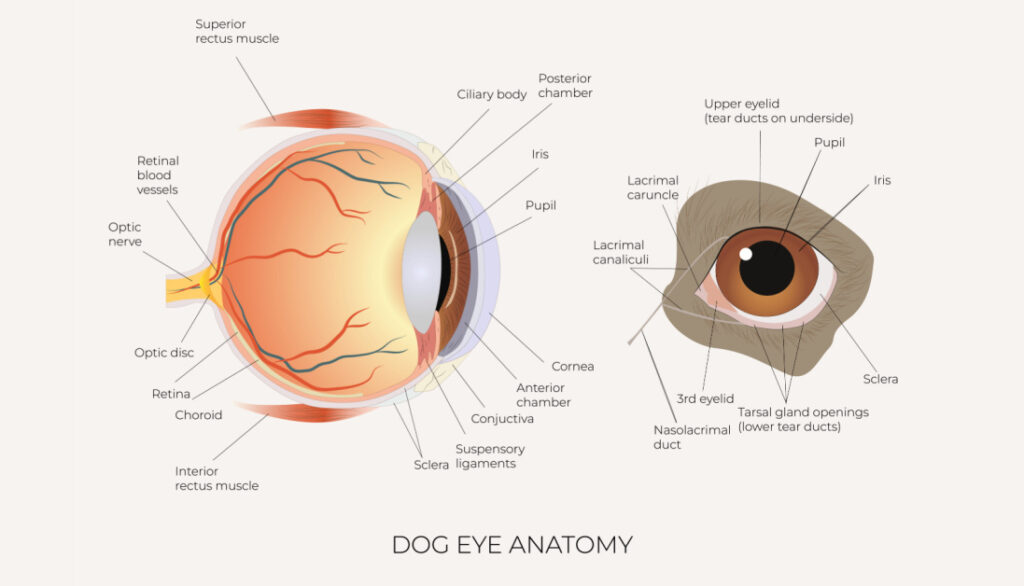
Common Eye Issues In Azawakh
As a veterinarian, I often see cases of eye health issues in Azawakh dogs. These elegant and slender hounds, originally from West Africa, are generally healthy but can occasionally suffer from certain eye problems. It’s essential for every Azawakh parent to be aware of these conditions for early detection and treatment.
The most common eye issues in the Azawakh breed are:
- Progressive Retinal Atrophy (PRA): This is a genetic condition often seen in Azawakhs. PRA gradually diminishes the retina’s function, leading to impaired vision and, in severe cases, blindness. Early signs include difficulty seeing at night or in low light.
- Entropion: This condition causes the eyelid to roll inward, leading to irritation as the lashes rub against the cornea. If you notice your Azawakh frequently squinting or tearing up, it might be suffering from entropion.
- Conjunctivitis: Also known as pink eye, this inflammation of the conjunctiva can cause redness, discharge, and discomfort. It’s usually due to an infection or an allergy.
Less common but still potential eye issues include corneal ulcers and cataracts. Any signs of cloudiness, redness, or discomfort in your Azawakh’s eyes should be checked by a vet immediately.
Diagnosing these conditions early can make a significant difference in Azawakh eye health. Regular eye examinations are crucial for early detection. As a vet, I recommend that all Azawakh parents schedule regular eye check-ups for their pets.
As for treatment, PRA currently has no cure, but antioxidants and certain dietary changes can slow down the progression. Entropion usually requires surgical correction, while conjunctivitis can often be managed with medication. Remember, every dog is unique, and treatment should always be individualized based on your Azawakh’s specific needs.
Ensuring good Azawakh eye health doesn’t stop at treating existing conditions. It also involves taking proactive steps to prevent eye problems, which we will explore in the next section.
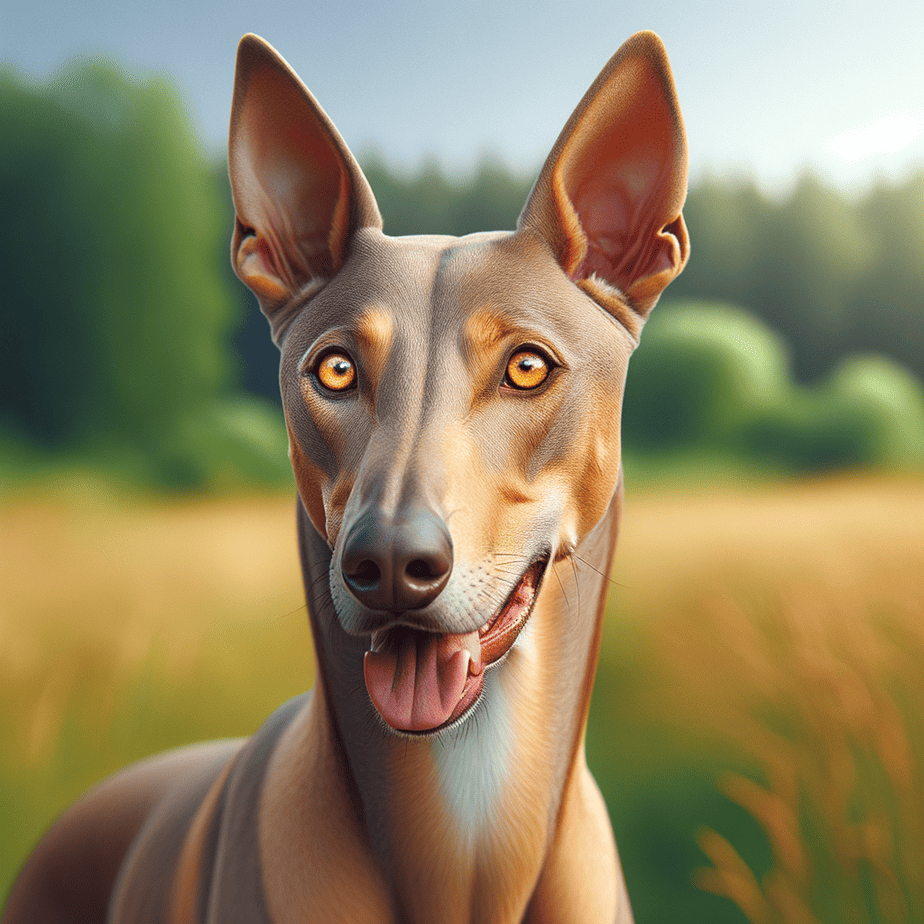
Prevention of Eye Problems
Ensuring your Azawakh gets the right nutrients for optimal eye health is essential for maintaining clear vision and preventing age-related issues. Natural, nutrient-rich foods and supplements can play a key role in supporting their eyesight. From vitamin A-packed freeze-dried liver treats to antioxidant-rich blueberries and targeted supplements like Eyeplex by Standard Process, there are several ways to nourish your dog’s eyes. In this section, we’ll explore how these powerful ingredients contribute to long-term vision health and overall well-being.
Eyeplex by Standard Process
Eyeplex by Standard Process is a specialized supplement designed to support your Azawakh’s eye health with a blend of essential nutrients. Formulated with key vitamins, minerals, and antioxidants, Eyeplex helps protect against oxidative stress, supports retinal function, and promotes overall vision health. Ingredients like vitamin A, vitamin C, and zinc contribute to maintaining strong eyesight, while whole food ingredients provide additional phytonutrients for cellular protection. Adding Eyeplex to your Azawakh’s diet can be especially beneficial for aging dogs or breeds prone to eye conditions, offering targeted nutritional support to keep their vision sharp and healthy for years to come.
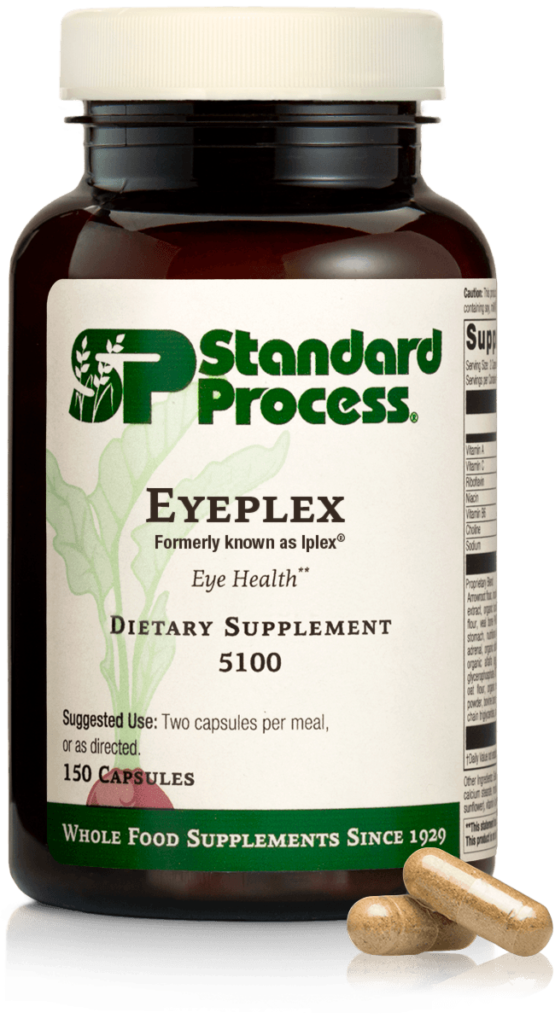
Freeze-Dried Blueberries
Freeze-dried blueberries are a powerhouse of antioxidants that can help protect your Azawakh’s eyes from oxidative stress and age-related damage. Rich in vitamins C and E, as well as anthocyanins, these tiny but mighty berries help combat free radicals that can contribute to eye diseases like cataracts and macular degeneration. Incorporating freeze-dried blueberries into your dog’s diet provides a natural and delicious way to support retinal health, reduce inflammation, and promote overall vision longevity. Plus, they’re a low-calorie, dog-friendly treat that makes a great addition to a balanced diet for long-term eye health.
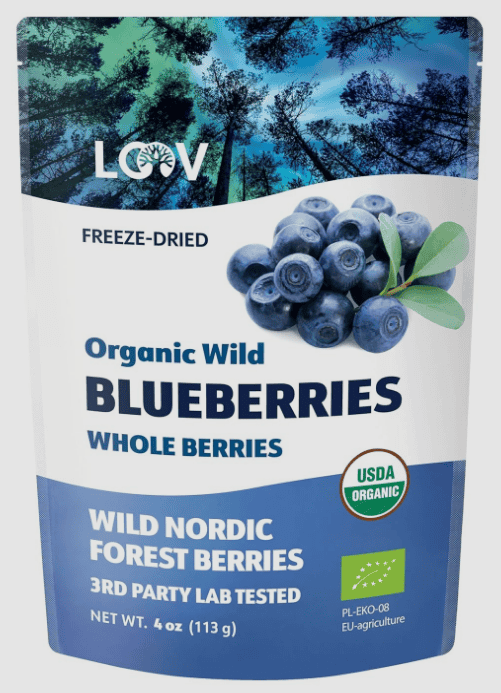
Freeze-Dried Liver
Freeze-dried liver treats are an excellent natural source of vitamin A, an essential nutrient for your Azawakh’s eye health. Vitamin A plays a crucial role in maintaining good vision, especially in low-light conditions, while also supporting overall immune function and skin health. Since liver is rich in bioavailable vitamin A, incorporating freeze-dried liver treats into your dog’s diet provides a convenient and nutritious way to promote optimal eye function. Just be sure to feed them in moderation, as excessive vitamin A can lead to toxicity. Adding these nutrient-packed treats to your pup’s routine is a simple, tasty way to support their long-term vision and well-being!
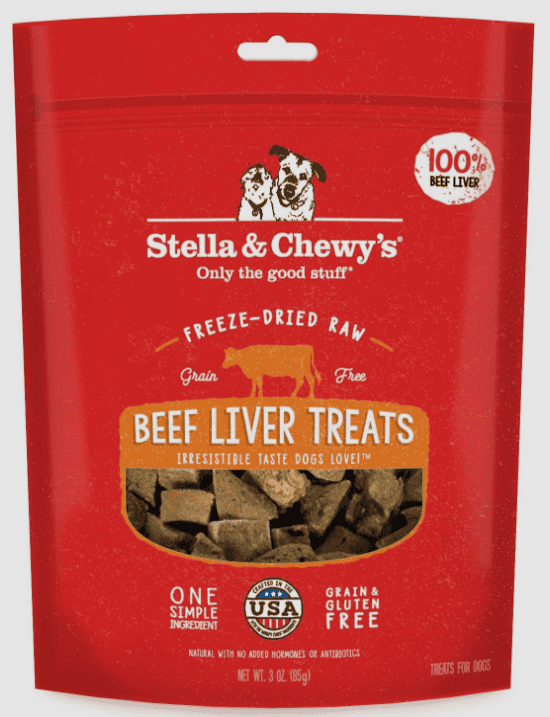
By prioritizing your Azawakh’s eye health through a balanced diet and nutritional supplements, you can help prevent many common eye issues. These simple steps can go a long way in ensuring your pup’s eyes stay healthy and clear for years to come.
When it comes to maintaining your Azawakh’s eye health, environmental hygiene plays a significant role. The quality of the environment in which your dog lives can significantly impact the well-being of their eyes. Let’s discuss some critical aspects of environmental hygiene that you should consider.
Indoor Air Quality
Indoor air quality is an essential aspect of environmental hygiene. Dust, smoke, and other airborne particles can irritate your Azawakh’s eyes, leading to redness, itching, and potential eye infections. Therefore, it’s essential to maintain clean, fresh air within your home. Regularly air out your rooms, use air purifiers, and avoid smoking indoors to keep the air clean. Also, remember to clean your dog’s bedding frequently to minimize dust and allergens.
Sprays, Diffusers, Candles, Incense
While sprays, diffusers, candles, and incense can make your home smell pleasant, they can also irritate your Azawakh’s eyes. Many of these products contain chemicals and fragrances that can cause eye irritation or allergies. Therefore, it’s advisable to use these products sparingly and in well-ventilated areas. If you notice your dog’s eyes becoming red or watery after using these products, it might be best to stop using them altogether.
When using cleaning sprays, make sure your Azawakh is in another room, and allow the area to air out before letting them back in. Opt for natural, fragrance-free candles and avoid using incense if your dog is in the same room.
Outdoor Environmental Factors
Outdoor environmental factors can also affect your Azawakh’s eye health. Exposure to strong sunlight can cause sunburn around the eyes, leading to discomfort and potential eye problems. When taking your Azawakh for walks, try to do so early in the morning or late in the evening when the sun is less intense. If necessary, consider using dog-safe sunscreen or protective eyewear.
Additionally, pollen, grass, and other outdoor allergens can cause eye irritation. If your Azawakh suffers from allergies, try to limit their exposure during high pollen times and rinse their eyes with a vet-approved saline solution after walks.
In conclusion, maintaining a clean, healthy environment is crucial for your Azawakh’s eye health. By being mindful of indoor air quality, being cautious with fragranced products, and considering outdoor environmental factors, you can help prevent eye issues and keep your Azawakh’s eyes healthy and bright.
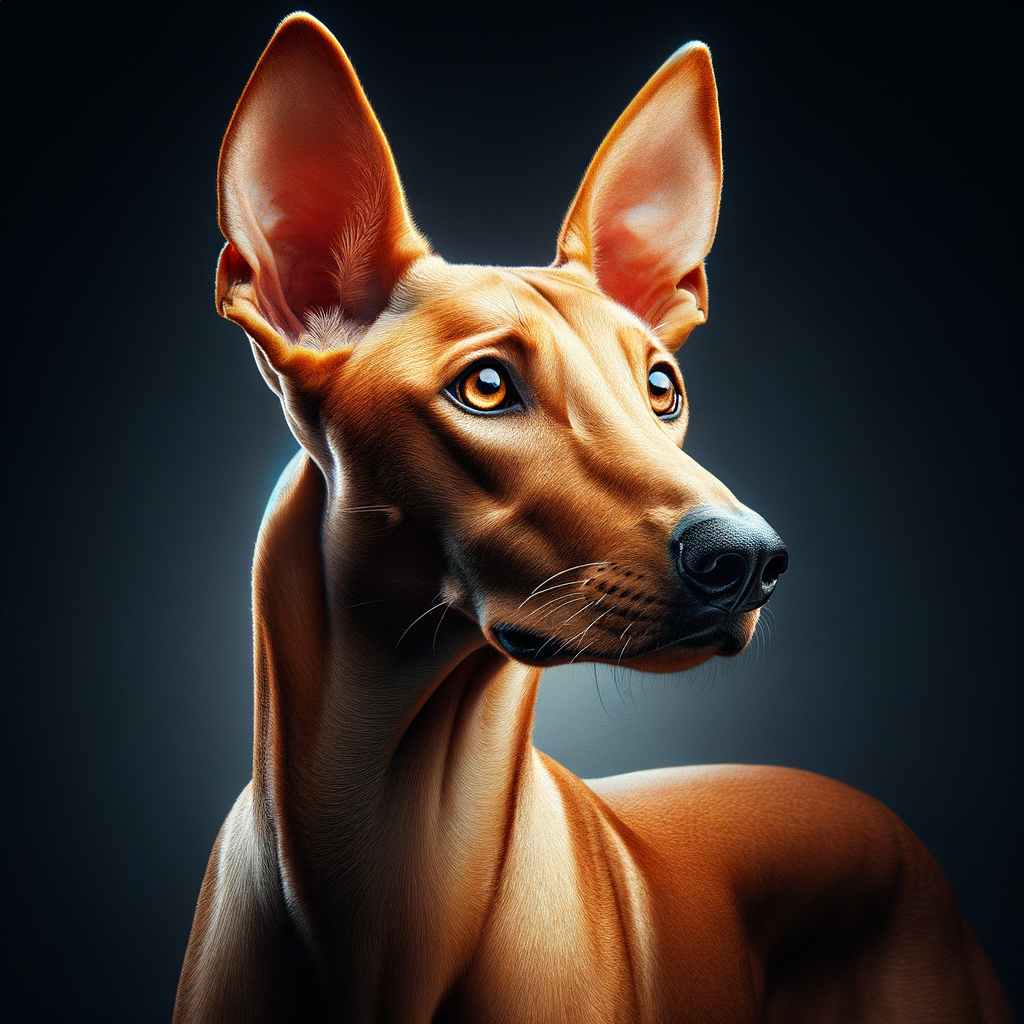
Routine Azawakh Eye Care & Maintenance
Keeping your Azawakh’s eyes healthy involves more than just dealing with problems as they arise. Regular eye care and maintenance can help prevent many common eye issues in this breed. Let’s talk about some daily and weekly routines you can establish to keep your Azawakh’s eyes in the best possible shape.
Daily & Weekly Care & Maintenance
One of the easiest and most effective ways to maintain your Azawakh’s eye health is by performing daily eye checks. Gently pull down your dog’s lower eyelid to check for redness or discharge. The whites of your Azawakh’s eyes should be clear, and the area around the eye should be clean and free of discharge. Any changes in color, swelling, or discharge could indicate a potential issue and should be brought to the attention of your vet.
Weekly, make sure to clean the area around your Azawakh’s eyes with a soft, damp cloth. This can help remove any buildup that could potentially lead to infection. Remember, never use soap or chemicals as they can irritate your dog’s eyes.
Monitor Hair Length, Nail Length, Bath Frequency
While it might not seem directly related, monitoring your Azawakh’s hair and nail length, as well as their bath frequency, can play a significant role in their eye health. Overgrown hair can irritate the eyes, leading to potential infections. Regular grooming, including trimming the hair around the eyes, can help prevent this.
Long nails can also pose a risk to your Azawakh’s eyes. If your dog scratches their face with long nails, they could accidentally injure their eye. Regular nail trimming can help prevent such accidents.
Bath frequency also plays a role in your Azawakh’s eye health. Too frequent bathing can strip the skin of its natural oils, leading to dryness and irritation around the eyes. On the other hand, infrequent bathing might lead to a buildup of dirt and bacteria, which can cause eye infections. Striking a balance is key – a bath every four to six weeks is usually sufficient, but this can vary depending on your dog’s lifestyle and skin condition.
Following these simple steps can go a long way in maintaining your Azawakh’s eye health. Of course, regular vet check-ups are also essential to catch any potential issues early. Remember, your vet is the best source of advice when it comes to your Azawakh’s health.
Frequently Asked Questions
What are common eye conditions in Azawakh dogs? Common eye conditions in Azawakh dogs include dry eye (keratoconjunctivitis sicca), cataracts, progressive retinal atrophy, and entropion.
How can I prevent eye problems in my Azawakh? To prevent eye problems in your Azawakh, it is important to keep their eyes clean and free from debris. Regular veterinary check-ups and proper nutrition can also contribute to maintaining good eye health.
What are the symptoms of eye problems in Azawakh dogs? The symptoms of eye problems in Azawakh dogs may include redness, excessive tearing, discharge, squinting, cloudiness, changes in pupil size, and frequent rubbing or pawing at the eyes.
Can eye problems in Azawakh dogs be treated? Yes, many eye problems in Azawakh dogs can be treated. The specific treatment will depend on the underlying condition. It is important to consult with a veterinarian for proper diagnosis and treatment options.
Are there any home remedies for Azawakh eye problems? While there may be some home remedies that can provide temporary relief for mild eye irritations, it is always best to consult with a veterinarian for proper diagnosis and treatment. Home remedies should not replace professional veterinary care.
